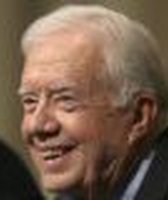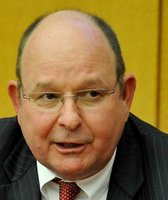Get PolitiFact in your inbox.
The 2012 campaign between President Barack Obama and Republican presidential candidate Mitt Romney has produced some memorable statements on how both men view U.S. relations with other nations.
Romney and Obama even had a debate devoted to international relations, even though they spent a good deal of that showdown talking about domestic issues.
Below are abbreviated versions of some of our rulings about international relations from the campaign. Look for the complete fact checks at the PolitiFact online sites.
Want to comment on our Truth-O-Meter rulings? It’s easy. Just go to our Facebook page: www.facebook.com/politifact.georgia?fref=ts. Readers can follow us on Twitter at: PolitiFactGA.
Obama: Romney called Russia our top geopolitical threat.
In the final debate of the presidential campaign, Obama tried to portray Romney as a novice who lacks understanding of complex world issues.
"Governor Romney, I'm glad that you recognize that al-Qaida is a threat because a few months ago when you were asked what's the biggest geopolitical threat facing America, you said Russia, not al-Qaida. You said Russia ... the 1980s, they're now calling to ask for their foreign policy back because, you know, the Cold War's been over for 20 years," Obama said.
Actually, Romney has twice drawn the distinction between his concerns about Iran and Russia. He has called Russia the biggest geopolitical foe or enemy for the U.S., but he has said the biggest threat is Iran.
We rated Obama’s statement Half True.
Romney: Said as president, Obama has never visited Israel.
Romney repeated a claim first made during a campaign ad in August following his trip to Israel.
Romney said that Obama has not been to Israel "as president," and that assertion is correct.
The Washington Post’s Fact-Checker examined the archives of the historian’s office at the U.S. State Department and found that seven of the last 11 presidents (dating to Harry Truman, who was in the White House when Israel was established) never visited Israel.
Democratic Presidents Jimmy Carter and Bill Clinton were the only ones to visit during their first term. President George W. Bush went to Israel twice during his last year in office.
That historical context is noteworthy. But the Romney ad’s claim is still accurate.
We rated Romney’s statement as True.
Obama: Says Romney "called the Arizona law a model for the nation."
In the second presidential debate at Hofstra University, Obama repeated a claim that he and many of his allies have made for months.
Referring to a high-profile Arizona immigration law known as SB 1070, Obama said Romney "called the Arizona law a model for the nation."
Soon after Obama made that claim, Romney fired back. "I did not say that the Arizona law was a model for the nation in that aspect," Romney said at the debate.
Obama’s statement mischaracterizes Romney’s salute to Arizona’s mandate that employers electronically verify the legal status of employees, which was passed in 2007 and was not included in SB 1070.
We rated the statement False.
Romney: Says stimulus money went to buy electric cars from Finland as a payback to Obama supporters.
In the presidential battle over who sent more jobs overseas, Romney and his supporters are fond of citing the example of Fisker Automotive, the maker of a high-end plug-in electric sedan.
In an ad called "Where did all the money go," the Romney campaign suggests Obama has a lot of explaining to do.
"Where did all the Obama stimulus money go?
Friends, donors, campaign supporters, special interest groups.
Where did the Obama stimulus money go?
Solyndra.500 million taxpayer dollars. Bankrupt.
So where did the Obama stimulus money go?
Windmills from China. Electric cars from Finland."
The federal loan guarantees the auto company received were not part of the stimulus. There is no evidence that any government dollars paid for work done by Finnish workers.
The contract to produce the cars in Finland had been signed before the federal loan was approved. Also, measures were put in place to ensure that taxpayer dollars only went for work done in America.
The ad’s suggestion that the Fisker loan was a reward to a political supporter also falls flat. The program was approved initially by the George W. Bush administration.
We rated the claim False.
Obama: Says Romney wants to add $2 trillion to the defense budget that military hasn't asked for.
With the country facing tough choices on spending and taxes, the defense budget, the largest single area of discretionary spending, plays a special role. In the first of three debates, Obama tried to pressure Romney on his defense plans, but the former Massachusetts governor did not allow himself to be drawn in.
Obama made at least four references to Romney’s goal to greatly ramp up military spending. Each time, he did it in the context of tax policy.
"Governor Romney's central economic plan calls for a $5 trillion tax cut," Obama said. "On top of the extension of the Bush tax cuts -- that's another $1 trillion -- and $2 trillion in additional military spending that the military hasn't asked for."
Independent analysts confirm that number, and Romney did not deny it.
Military leaders have testified in support of the president’s spending plan, and we found no evidence of disagreement behind the scenes.
We rated the statement True.
Romney: "The president said he was going to create daylight between ourselves and Israel."
Romney made this claim during the third presidential candidates debate to give credence to his criticism that Obama doesn’t hold the Jewish state in a tight enough embrace.
The "daylight" comment stems from a July 15 story in The Washington Post about a meeting Obama held in 2009 with several Jewish leaders. The meeting was closed to the media, and there is no transcript of what was said. The Post story was based on interviews with people in the meeting.
Here’s the relevant excerpt:
"Look at the past eight years," he said, referring to the relationship the George W. Bush administration had with Israel. "During those eight years, there was no space between us and Israel, and what did we get from that? When there is no daylight, Israel just sits on the sidelines, and that erodes our credibility with the Arab states."
The White House does not confirm that Obama said those words.
That said, Romney is fairly characterizing a quote attributed to Obama, which the White House has not denied.
We rated Romney's claim Mostly True.
Romney: "Pakistan has 100 nuclear warheads, and they're rushing to build a lot more. They'll have more than Great Britain sometime in the relatively near future."
Pakistan emerged as a source of concern during the third presidential debate in Boca Raton, Fla., which focused on foreign policy.
At one point, Romney said: "Pakistan is important to the region, to the world and to us, because Pakistan has 100 nuclear warheads and they’re rushing to build a lot more. They’ll have more than Great Britain sometime in the relatively near future."
We wondered whether Pakistan, a relative newcomer to the nuclear club, was really poised to leapfrog longtime nuclear power Great Britain.
While there is an enormous amount of uncertainty about how fast Pakistan will expand its nuclear arsenal, experts tell us that there’s a plausible path for its total to match the U.K.’s in roughly a decade.
So we rated Romney’s claim Mostly True.
Obama: Says Romney said "we should ask Pakistan for permission" to take a shot at Osama bin Laden.
In an attempt to portray Romney as "all over the map" on foreign policy, Obama said the candidate once said the United States "should ask Pakistan for permission" to strike Osama bin Laden.
"When it comes to going after Osama bin Laden, you said, well, any president would make that call," Obama said at the debate in Boca Raton, Fla. "But when you were a candidate in 2008, as I was, and I said if I got bin Laden in our sights I would take that shot, you said we shouldn't move heaven and earth to get one man. And you said we should ask Pakistan for permission. And if we had asked Pakistan permission, we would not have gotten him. And it was worth moving heaven and earth to get him."
Romney did express a preference for working with the Pakistanis, and he attacked Obama for saying he would strike if then Pakistani leader Pervez Musharraf wouldn’t.
But Romney’s clearest objection was to Obama saying the United States would attack inside Pakistan without approval — not to the option itself. "We keep our options quiet," he said.
Obama oversimplified Romney’s stance four years ago.
We rated his statement Half True.
Our Sources
See individual ruling for sources.

















































